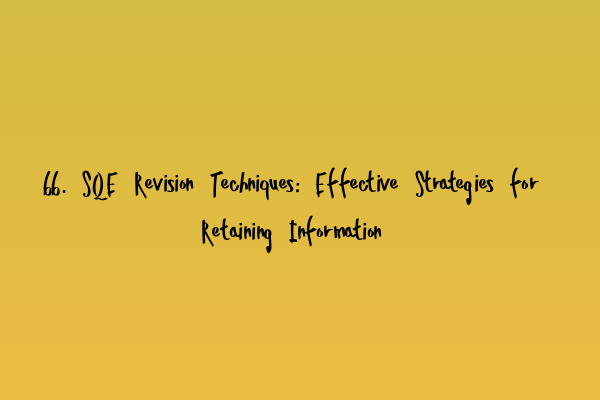66. SQE Revision Techniques: Effective Strategies for Retaining Information
Preparing for the Solicitors Qualifying Exam (SQE) can be a daunting task. The comprehensive nature of the exam requires candidates to retain a significant amount of information across multiple subjects. To succeed, it is crucial to develop effective revision techniques that maximize your ability to retain information. In this blog post, we will explore some tried and tested strategies to help you retain information effectively for the SQE exams.
The SQE Exam Structure and Content
Before diving into revision techniques, let’s briefly recap the structure and content of the SQE exam. The SQE consists of two parts: SQE1 and SQE2. SQE1 assesses candidates on their functioning legal knowledge and legal research skills, while SQE2 focuses on practical legal skills.
SQE1 covers seven Foundational Legal Knowledge (FLK) subjects: Constitutional Law and Judicial Review, Contract Law, Criminal Law, EU Law, Property Law and Practice, Tort Law, and Trusts Law and Practice. On the other hand, SQE2 evaluates advocacy, client interviewing and advising, legal research, legal writing, and drafting skills.
Now that we have outlined the content of the SQE exam, let’s delve into the revision techniques that can help you effectively retain the information needed to succeed in the exam.
1. Active Reading and Note-taking
Active reading and note-taking are essential techniques for retaining information during the revision process. Rather than passively reading through textbooks and materials, actively engage with the content. Underline important points, make annotations, and highlight key concepts. This process helps you actively process the information and improves retention.
When taking notes, opt for a structured approach. Use headings, subheadings, and bullet points to organize and summarize the material. Summarizing complex concepts in your own words aids in understanding and retention. Additionally, color-coding or using different fonts can help you visually associate key points with specific topics.
For SQE1 subjects, consider using flashcards to reinforce your understanding of key legal principles and definitions. Sites like Quizlet offer digital flashcards, providing an interactive and engaging way to revise.
2. Create Mnemonic Devices and Acronyms
Mnemonic devices and acronyms are memory aids that help you remember and recall information more easily. Creating mnemonics involves associating the first letters of important information with a keyword, phrase, or image.
For example, if you struggle to remember the elements of a valid contract, you could create the acronym CATS: Consideration, Agreement, Terms, and Capacity. Associating the word CATS with the elements of a contract helps you recall the necessary information quickly during an exam.
Mnemonic devices and acronyms can be especially helpful in memorizing lists, statutes, case names, and elements of various legal concepts. Be creative and find associations that work best for you.
3. Practice Active Recall and Spaced Repetition
Active recall involves actively retrieving information from memory. Instead of merely reviewing notes or material, attempt to recall the information without prompts. Test yourself on key concepts and principles. This technique enhances long-term memory storage and improves your ability to retrieve information during exams.
Combine active recall with spaced repetition for optimal retention. Spaced repetition involves revising information at increasingly spaced intervals over time. Rather than cramming information all at once, revise regularly in shorter sessions. This approach prevents forgetting and reinforces comprehension.
Use digital flashcards or online tools like Anki that utilize spaced repetition algorithms to create study schedules tailored to your learning needs. This systematic approach ensures that you revise effectively and avoid overwhelming yourself with excessive information.
4. Utilize SQE Practice Exam Questions and Mock Exams
Practice exams and mock tests are invaluable resources for SQE preparation. They provide an opportunity to apply your knowledge, identify areas of improvement, and simulate exam conditions.
Before the exam, familiarize yourself with the format and structure of the SQE1 and SQE2 exams. Complete practice questions and mocks to enhance your understanding of the question style and time management techniques required.
You can find SQE1 practice exam questions and SQE2 practice mocks on our website to supplement your revision. Make use of these resources to gauge your progress and pinpoint areas that require further revision.
5. Join Revision Courses and Study Groups
Revision courses and study groups offer a collaborative learning environment that can boost your retention and understanding of the SQE material. Interacting with fellow students allows for discussions, clarification of difficult concepts, and the exchange of revision techniques.
Consider enrolling in SQE 1 preparation courses or SQE 2 preparation courses. These courses cover the syllabus comprehensively and provide you with professional guidance and support throughout your revision journey.
Additionally, join study groups or online forums where you can engage with like-minded individuals, share study resources, and seek clarification on challenging topics. Collaborative learning fosters a deeper understanding of the material and offers valuable insights from different perspectives.
Final Thoughts
Effective revision techniques are vital for maximizing information retention and passing the SQE exams. Active reading and note-taking, mnemonic devices, active recall with spaced repetition, practice exams, and revision courses are just a few strategies that can improve your study approach.
As you prepare for the SQE exams, remember to stay consistent, take breaks when needed, and focus on understanding the underlying principles of the law rather than simply memorizing facts. By combining these revision techniques with dedication and perseverance, you’ll be well on your way to a successful SQE exam experience.
Related Articles:
